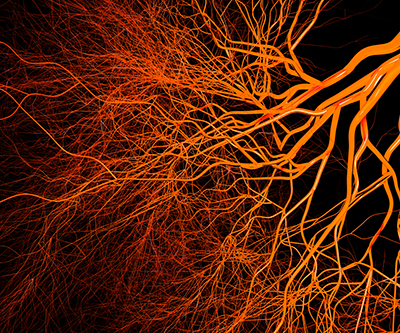
Stock image of blood vessels.
Blood vessels are responsible for transporting oxygen throughout the body. Malformations in blood vessels are rare diseases that can lead to a variety of health problems. People with these vascular conditions tend to have hard-to-detect genetic causes because the pathogenic variant (previously known as a mutation) only occurs in some tissues and not in the whole body. This occurrence is called somatic mosaicism.
Turner syndrome occurs when a female is missing part or all of an X chromosome. Common disorders of the vascular system in Turner syndrome include lymphedema and aortic coarctation. In rare cases, a person with Turner syndrome can also have other vascular malformations that are associated with secondary conditions. In a study led by the Sheppard Lab, researchers evaluated two patients with Turner syndrome who also had vascular malformations.
- Historically, researchers believed that vascular conditions are a rare occurrence that is a symptom of Turner syndrome.
- In the study, the researchers found that the vascular conditions observed in the two patients were not caused by the absent X chromosome. Instead, the vascular malformations were caused by a somatic pathogenic variant PIK3CA.
- In the study, 2 out of 345 Turner syndrome were evaluated for a vascular malformation, which is about 1 percent of the group. This percentage is similar to the expected incidence of vascular malformations in the general population.
- Overall, the findings indicate that some vascular malformations are a separate condition from Turner syndrome. Therefore, healthcare providers should not consider it as part of the syndrome’s spectrum, and they may consider PIK3CA-related therapies if their patients have severe vascular malformations.
Learn more about the Developmental Endocrinology, Metabolism, Genetics & Endocrine Oncology Affinity Group: https://www.nichd.nih.gov/about/org/dir/affinity-groups/DEMG-EO.
 BACK TO TOP
BACK TO TOP